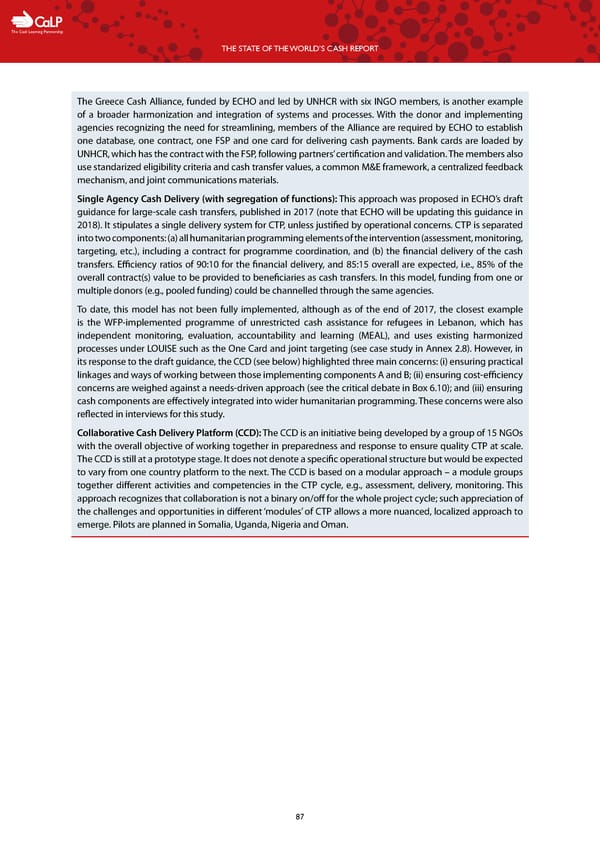C The Cash Learning Partnership THE STATE OF THE WORLD’S CASH REPORT The Greece Cash Alliance, funded by ECHO and led by UNHCR with six INGO members, is another example of a broader harmonization and integration of systems and processes. With the donor and implementing agencies recognizing the need for streamlining, members of the Alliance are required by ECHO to establish one database, one contract, one FSP and one card for delivering cash payments. Bank cards are loaded by UNHCR, which has the contract with the FSP, following partners’ certification and validation. The members also use standarized eligibility criteria and cash transfer values, a common M&E framework, a centralized feedback mechanism, and joint communications materials. Single Agency Cash Delivery (with segregation of functions): This approach was proposed in ECHO’s draft guidance for large-scale cash transfers, published in 2017 (note that ECHO will be updating this guidance in 2018). It stipulates a single delivery system for CTP, unless justified by operational concerns. CTP is separated into two components: (a) all humanitarian programming elements of the intervention (assessment, monitoring, targeting, etc.), including a contract for programme coordination, and (b) the financial delivery of the cash transfers. Efficiency ratios of 90:10 for the financial delivery, and 85:15 overall are expected, i.e., 85% of the overall contract(s) value to be provided to beneficiaries as cash transfers. In this model, funding from one or multiple donors (e.g., pooled funding) could be channelled through the same agencies. To date, this model has not been fully implemented, although as of the end of 2017, the closest example is the WFP-implemented programme of unrestricted cash assistance for refugees in Lebanon, which has independent monitoring, evaluation, accountability and learning (MEAL), and uses existing harmonized processes under LOUISE such as the One Card and joint targeting (see case study in Annex 2.8). However, in its response to the draft guidance, the CCD (see below) highlighted three main concerns: (i) ensuring practical linkages and ways of working between those implementing components A and B; (ii) ensuring cost-efficiency concerns are weighed against a needs-driven approach (see the critical debate in Box 6.10); and (iii) ensuring cash components are effectively integrated into wider humanitarian programming. These concerns were also reflected in interviews for this study. Collaborative Cash Delivery Platform (CCD): The CCD is an initiative being developed by a group of 15 NGOs with the overall objective of working together in preparedness and response to ensure quality CTP at scale. The CCD is still at a prototype stage. It does not denote a specific operational structure but would be expected to vary from one country platform to the next. The CCD is based on a modular approach – a module groups together different activities and competencies in the CTP cycle, e.g., assessment, delivery, monitoring. This approach recognizes that collaboration is not a binary on/off for the whole project cycle; such appreciation of the challenges and opportunities in different ‘modules’ of CTP allows a more nuanced, localized approach to emerge. Pilots are planned in Somalia, Uganda, Nigeria and Oman. 87
 The State of the World's Cash | Full Report Page 88 Page 90
The State of the World's Cash | Full Report Page 88 Page 90